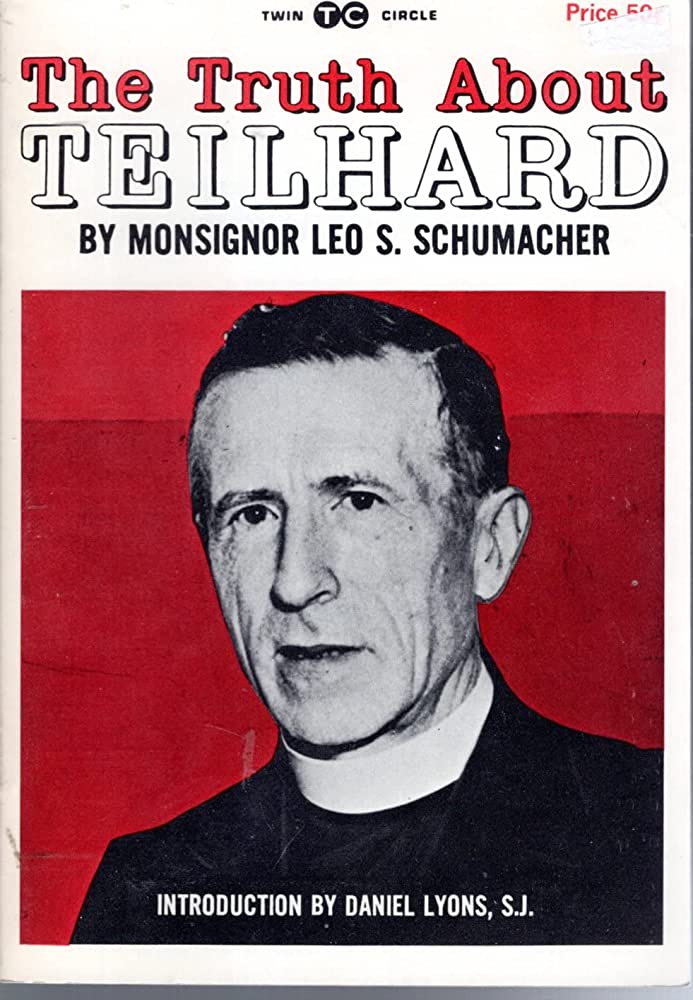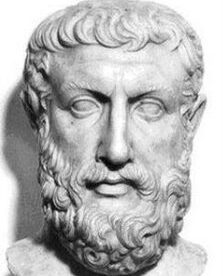
Available at Archive.org
Length of book: 46 pages
Numbering among the most infamous modernists, Teilhard de Chardin is considered one of the great theologians by many in the Post-Conciliar Church, from the lowest offices to the highest. For example, in 2014 the now-deceased Pope Benedict XVI praised the “great vision” of Teilhard de Chardin,1 this being his idea that “at the end we will have a true cosmic liturgy, where the cosmos becomes a living host.” Anyone who takes up this brief work will recoil in horror at the very thought a papal claimant could say something of this sort, for within its pages one finds a concise and stirring summation of his errors, compacted with convincing refutations.
The most disturbing of de Chardin’s false beliefs was his assertion that, having first accepted the noxious tenets of Darwinism, that the very universe itself is an organism on a course of “evolution”. Though humanity is the “highest stage” of this evolution, progress will march on until a new “super-humanity” is born, which is “a gigantic collective super-organism as well as a supreme consciousness” (22). This in turn will lead to the “Christogenesis” of the universe, as Msgr. Schumacher relates:2
That phase of evolution, or at least, the highest part of it, in which man evolves into the superhuman, Teilhard calls Christogenesis — the universe becoming fully Christ.
(31)
Thus, it is from this disturbing genesis that de Chardin coins the term “Christ-Universal”, one suspiciously in tune with the later rebranding of the Feast of Christ the King as the Feast of the Christ, King of the Universe in the Novus Ordo Liturgy:
Christ and the Universe form a “mysterious compound” which he names the Christ-Universal. What prompted this combination title? It is simply another formulation of Teilhard’s solution to his basic problem: how to reconcile the two religions, Faith in the Christian God and Faith in the Universe. It is done by identifying God and the Universe; in this context, Christ and the Universe. Thus we have the Christ-Universal.
(29-30)
Thus de Chardin’s blasphemy that man will achieve apotheosis via “evolution” finds its way into the “legitimate” calendar of the Roman Rite!
Countering the presentation of de Chardin’s attempt at presenting his concept of God as a kind of hivemind who annihilates the identity of the human person, Msgr. Schumacher catches Chardin in a theological quagmire:
Persons do not dissolve and vanish in God (false pantheism) but become more distinct in Him. Why? Because “union differentiates.” Union does nothing of the kind, but that does not phase Teilhard because he is bent on having his cake and eating it too. So he continues his efforts to square the circle. God is not all, but all in all. He is perfectly one, but supremely complex. ‘The perfection of his unity lies in this complexity.’ Though one, he is ‘the distinct sum of persons’ and can be defined only as ‘a Center of centers.’ God is both one and many, but this should not puzzle us because ‘the one ceases to be opposed to the multiple.’ Thus Teilhard’s pantheism sinks in the quicksand of contradiction.
(27)
Therefore, on account of the thorough research of the author and his superb presentation of the facts, I heartily recommend this book. Published in 1968, it packs the same, if not more powerful punch as it did all those years ago—it is surely a shame that it seems not to have gotten a reprint since then.
- Allen Jr., John L. “Pope cites Teilhardian vision of the cosmos as a ‘living host’.” National Catholic Reporter. 28 July 2009. www.ncronline.org/news/pope-cites-teilhardian-vision-cosmos-living-host.
-
All quotations of this text are provided from:
S. Schumacher, Msgr. Leo. The Truth About Teilhard. Twin Circle. 1968.
